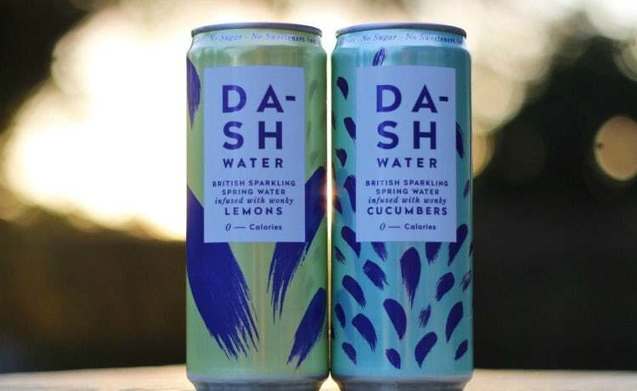Democratising wellbeing
In the startup world, a number of brands are seeking to democratise wellbeing by making healthy products accessible to everyone.
Dash Water takes misshapen lemons and cucumbers that are not a high enough grade to be bought by supermarkets and turns them into a zero-calorie flavoured water. The sustainable water brand describes itself as a combination of wellness and lifestyle, aiming to offer a credible alternative to high sugar drinks on the mainstream market.
“I don’t necessarily see the brand as a wellness, health brand,” explains co-founder Jack Scott.
“I see it as more of a lifestyle brand that offers something credible that tastes good and doesn’t have any of the artificial sweeteners or sugar. We want to be accessible to all. We’re not selling a £6 juice that only certain people can buy.”
Dash Water has deliberately opted for a mixture of stockists from Planet Organic and Farmdrop to Selfridges and Amazon to match its “everyday premium” positioning.
“Starting out, our sales strategy was to concentrate on some key retailers that created a little bit of a buzz around the brand,” Scott explains.
“The nature of making a product is expensive to begin with because you’re not making large volumes. However, going forward part of our strategy is to make a product that is accessible to all or ‘everyday premium’.”
Accessibility is also at the heart of pop-up wellbeing dining experience Little Bee Kitchen. Launched in the south London area, the pop-up creates bespoke, nutritionally balanced set menus hosted at guest restaurants. Run by nutritional therapist Chloe Bannerman and wellbeing advocate Mary Anderson-Ford, Little Bee Kitchen aims to democratise healthy eating.
“We help the restaurant put together an interesting menu of the latest foods people are eating, but maybe don’t know how to cook,” Anderson-Ford explains.
“It’s about putting together really unusual ways of cooking that people don’t really think about. We generally try to hook up with a charity at the same time that makes money from the ticket price and any additional drinks sales, as well as selling merchandise like tote bags and tea towels.”
On a daily basis, Little Bee Kitchen posts homemade meal inspiration to Facebook and Twitter in order to keep the community engaged between its events.
“Social media is so important. Twitter and Facebook seem to be the best way to connect with people for a business as young as Little Bee Kitchen which doesn’t have all that much money to spend on the marketing and PR,” says Anderson-Ford.
Cracking a new market
Going from market leader to a relative startup is the challenge being faced by Aussie fitness wear brand Lorna Jane, which is looking to expand into the UK. Established in 1989, the brand has 140 stores across Australia and describes itself as a technical fashion label, offering the performance credentials of anti-pilling, anti-fade fabric with the relaxed look of loungewear.
The brand has adopted a wholesale model to drive brand awareness, combined with investment in social, influencers and bloggers. Lorna Jane plans to hit the UK mass market through wholesale tie-ups with department store groups, online retailers and stores like JD Sports, which it launched with in late 2017.
With plans to debut on Asos in three month’s time, sales director Claire Lamb explains that Lorna Jane wants to stretch from a commercial price point to premium retailers like Selfridges, Net-a-Porter and Harvey Nichols, as well as setting up its own retail locations.
“Stealing market share from others is not easy, but I think we’re niche in what we offer as it’s that technical element with that fashion credibility. We are a price point above mainstream brands, but I think people are getting board of the standard brands and they’re looking for something different,” says Lamb.
She believes that having continuous collections with new product coming through on a quick turnaround is crucial in a market like the UK where consumers shop regularly. It will also help them to engage customers throughout the year.
While all these brands may have launched with a very specific target market in mind, as consumers’ appetite for healthy lifestyle brands rises, there is opportunity for these brands to grow too, if they can find the right message to reach the masses.
Sourced through Scoop.it from: www.marketingweek.com



Leave A Comment